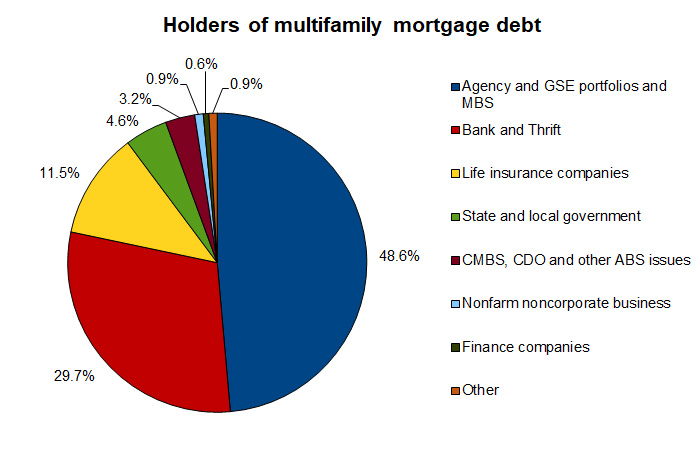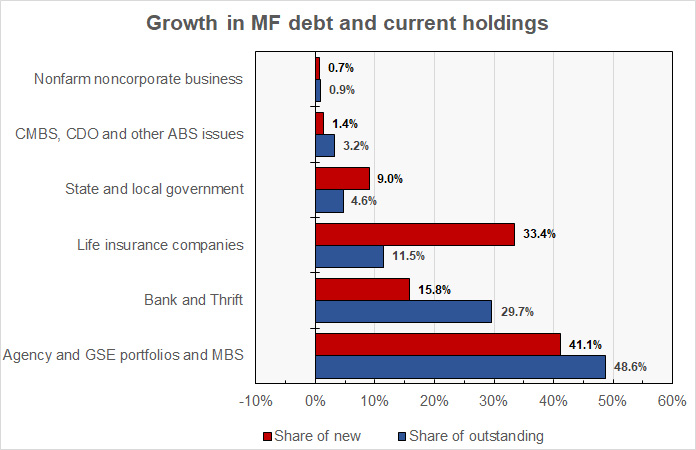Growth in multifamily mortgage debt increases in Q3
December 31, 2024

- CFPB Targets Rocket Mortgage For Alleged Kickbacks
- Will mortgage rates fall below 6% in 2025? What experts say
- Reverse mortgage book inside MMI Fund continues to evolve
- I almost made the mistake of paying for mortgage insurance. What homeowners need to know
- Predictions Point Towards “Higher for Longer” Mortgage Rates in 2025
The Mortgage Bankers Association (MBA) reported that multifamily mortgage debt outstanding rose by $29.83 billion in Q3 from the revised level of the quarter before. Total multifamily debt reached a level of $2.123 trillion. Compared to the year-earlier level, debt was up $63.0 billion (3.1 percent).
Bạn đang xem: Growth in multifamily mortgage debt increases in Q3
The growth in multifamily mortgage debt outstanding in Q3 was up 54.2 percent from the growth originally reported for Q2. However, the debt outstanding in Q2 was revised higher by $3.64 billion in the latest report.
The total of all commercial mortgage debt, including multifamily debt, outstanding at the end of Q3 rose 1.0 percent from its revised Q2 level to $4.745 trillion. Multifamily mortgage debt represented 44.7 percent of commercial mortgage debt outstanding.
Earlier, the MBA had reported that multifamily mortgage originations had risen 52.5 percent in Q3. The Q3 2024 multifamily originations index was reported to be up 56.5 percent from its level in Q3 2023.
Who’s holding?
The shares of multifamily mortgage debt held by various classes of suppliers are shown in the first chart, below.

The largest share of multifamily mortgage debt was held by “Agency and GSE portfolios and MBS”. These are agencies, like the Federal Housing Administration and Government Sponsored Enterprises (GSEs) like Fannie Mae and Freddie Mac, who buy up mortgages and sell some of the debt as Mortgage-Backed Securities (MBS). At the end of Q3, the GSEs’ holdings of multifamily mortgage debt fell 0.2 percentage points quarter-over-quarter to 48.6 percent of the total outstanding. The GSEs held $1,033 billion in multifamily debt at the end of the quarter, up $12.27 billion.
Banks and Thrifts, the second largest holders of multifamily mortgages, increased their multifamily holdings by $4.71 billion to $630 billion. However, their share of debt outstanding fell 0.2 percentage points to 29.7 percent.
Life Insurance companies were reported to increase their direct holding of multifamily mortgage debt by $9.97 billion in the quarter, over double last quarter’s increase. They held $244 billion in mortgages at the end of the quarter. Their share of total multifamily debt outstanding rose 0.3 percentage points from the revised level of the quarter before to 11.5 percent. However, this figure does not account for the multifamily mortgages these companies hold through commercial mortgage-backed securities (CMBS).
State and local governments held 4.6 percent of outstanding multifamily mortgage debt at the end of Q3, unchanged from the revised level reported for the previous quarter. They increased their holdings by $1.48 billion to a total of $90.99 billion at the end of the quarter.
CMBS, CDO (collateralized debt obligations) and other ABS (asset backed securities) issuers increased their holdings of multifamily mortgage debt in Q3 by $543 million to $67.76 billion. Their share of multifamily debt outstanding was unchanged at 3.2 percent.
Who’s growing?
The next chart, below, plots the current share of multifamily mortgage debt outstanding for a given class of lender alongside that class of lender’s share of net new mortgage debt outstanding in Q1. When the latter share is greater than the former, that class of lender is increasing its share of the multifamily mortgage market.

The chart shows that the GSEs’ share of the net increase in multifamily mortgage debt outstanding was lower than their share of current holdings. Of the net increase in multifamily debt outstanding in the quarter, 41.1 percent came from the GSEs.
Banks and thrifts provided only 15.8 percent of the net increase in multifamily mortgage debt outstanding. This is well below their holdings of 29.7 percent of total multifamily debt outstanding. Basically, the banks kept their net new mortgage issuance at the same level as the prior quarter while other lenders increased their holdings at a higher rate.
Life insurance companies grew their holdings at a rate nearly triple their share of multifamily mortgage debt outstanding. Their increase in mortgage holdings was also double that of life insurance companies for the quarter.
State and local governments also increased their holdings of multifamily debt at a rate nearly double their share of current holdings.
As was the case last quarter, the shares of the growth in multifamily mortgage debt outstanding of the other lender types in the top 6 were less than their shares of existing mortgage debt. Therefore, they are continuing to become relatively less important as sources of funds.
The report does not cover loans for acquisition, development or construction, or loans collateralized by owner-occupied commercial properties. The full report also includes information on mortgage debt outstanding for other commercial property types. The full report can be found here.
Nguồn: https://modusoperandi.my
Danh mục: News

